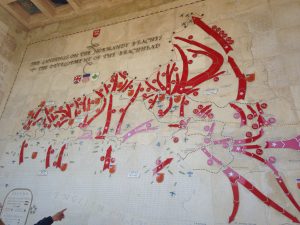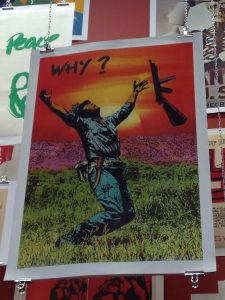I hate to take a cynical tone on such a pleasant trip, but the many cemeteries and memorials in Caen gave me a certain sense of unease beyond the norm for grave sites. It wasn’t until we arrived in Paris and a group of us visited an exhibit of student art that I was able to pin down what I felt.
The American Cemetery and German Cemetery that we visited in Caen were impressive; they were expansive as well as aesthetically pleasing, with great attempts at tastefulness. So too were the exhibits at Pointe du Hoc; they added information in a maze like expanse of the bombed, grassy clifftop to keep the visitor following a certain trail. Each site reminded us that, no matter what side the person fought on, all people deserve dignity in death.
However, all of these memorials lacked a certain nuance. The American Cemetery, for instance, featured a giant statue of a youth rising from the waves to heaven, or perhaps just a better life. Behind it was a mural of the strategic landing sites of the D-Day invasion. This was to honor the noble decisions the young men made in choosing to fight for their country and the freedom of others.
The German Cemetery displayed very subdues grave markers, and the various inscriptions and descriptions of these dead soldiers emphasized their humanity, their youth, rather than that they fought for Hitler’s Germany. I could not wrap my head around what bothered me until now. Both American and German soldiers were subjected to the draft; it seems like such a cognitive disconnect to honor one side of dead young men for their brave choices, and to attempt to lessen the guilt of the other by highlighting their lack of choice in the matter.
These sites, in trying to maintain the dignity of both sides of the war and lacking culpability for sending these men to war, strayed into glorifying the war itself, rather than honoring those that died.
While the Allies were definitely north of the Axis’ morally speaking, they were still by no means without fault. I feel that the United States uses sites like this to point to their moral upstanding, ignoring the antisemitism, racism, and sexism present in their own troops in WWII. Now, seventy odd years after World War II, it would be nice to see more nuance in the memorials of such events. That way future wars do not go against the will of the people, such as with the protested Vietnam War, with Parisian poster shown below.

